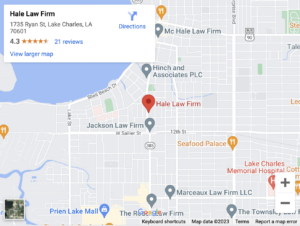
When you suffer an injury due to someone else’s intentional or negligent actions, you can often pursue a claim against them to recover your resulting economic losses. The most common types of economic damages include the losses you incur due to medical bills, lost income, and diminished earning capacity.
But accident victims often overlook their out-of-pocket expenses. These expenses could range from the $5 you spent on parking for a doctor’s appointment to the $2,500 you paid to install a wheelchair ramp after a workplace accident.
Here is what you need to know about out-of-pocket expenses and what they mean for your Louisiana personal injury claim.
Identifying and Proving Your Out-of-Pocket Expenses

Out-of-pocket expenses are simply characterized by the fact that you paid them. It does not matter whether you use cash or credit to pay them. It also does not matter whether the funds came from your wages, savings, or loans.
But unpaid expenses are not out-of-pocket costs. For example, suppose that you needed an ambulance after a semi-truck accident. The ambulance operator billed you. Even though you have a legal obligation to pay it, the bill does not become an out-of-pocket expense until you pay it.
Your injury claim can include all losses associated with your accident, whether they come from unpaid bills or out-of-pocket expenses. To show that a loss qualifies, you must demonstrate that it was caused by the at-fault party’s actions. You must also prove that the expense was reasonable and necessary.
Causation
Under Louisiana law, you must prove that the at-fault party’s actions were the proximate cause of your losses. Causes-in-fact include all events that eventually resulted in your injury. Proximate causes only include those for which people can get held legally responsible.
For example, suppose that someone taped a small “for sale” sign on the outside of their car. While driving on the freeway, the sign flew away and hit your windshield. The impact startled you, and you swerved off the road and hit a bridge support.
You may argue that the paper that hit your windshield caused your crash. But a judge or jury would need to decide whether it was a proximate cause by analyzing whether an auto accident was a foreseeable result of taping a sign on the outside of a car window.
Reasonableness
An expense is reasonable if it is not excessive in view of the losses you suffered. Thus, if you suffered a broken nose in your accident, treatment to set your broken nose would be reasonable. On the other hand, plastic surgery to reshape your nose might not be reasonable unless your broken nose was disfigured in some way.
Necessity
Necessity refers to the connection between your accident and your loss. If your accident broke your eyeglasses and you paid out-of-pocket for new glasses, you can seek reimbursement for the amount you paid.
Examples of Out-of-Pocket Expenses in a Personal Injury Case
An out-of-pocket expense can come from almost any source as long as it satisfies the test. Some common categories of these costs include:
Medical Treatment
You will probably incur significant out-of-pocket expenses to receive medical treatment. If you have health insurance, your insurer will probably cover your injuries. But most health insurance plans require you to pay a copay or meet a deductible before your coverage kicks in. And if you are uninsured, many providers will only provide treatment if you pay at the point of service.
Your injuries may require first aid and over-the-counter treatments — like bandages and pain relievers — not covered by your insurance. Similarly, you may need to pay out-of-pocket for medical devices like crutches or wheelchairs.
Home Modifications
You may need to modify your home to accommodate the disabilities caused by your injuries.
Some common expenses for modifications include:
- Wheelchair ramps
- Grab bars
- Roll-in showers
- Flat thresholds
- Widened doors
The reasonableness and necessity of these modifications will often depend on whether you suffered long-term or temporary disabilities.
Replacement Services
Replacement services help you care for yourself, your family, and your home after your injuries.
Examples of replacement services you may need include:
- Childcare
- Cleaning
- Cooking
- Shopping
- Transportation, such as rideshares or taxis
In some instances, you may even need an in-home caretaker to assist you in daily activities, such as dressing, showering, and using the bathroom.
Transportation
You may also need to pay for transportation after losing your vehicle in a car accident. For example, you may need to pay for a rental car, hire rideshares, or buy a bus pass. These expenses qualify as reasonable and necessary out-of-pocket costs.
And if you cannot get medical treatment locally, you may need to travel for medical care. If a doctor sends you out of town to see specialists, you can include your travel expenses in your injury claim.
Working With Your Louisiana Personal Injury Lawyer To Recover Out-of-Pocket Expenses and Other Losses
A Lake Charles personal injury lawyer can advise you of the types of financial records you will need to document your out-of-pocket expenses. They will include these records with your insurance claim to try to get you reimbursed. A lawyer will also walk you through some common expenses so you include all of them.
To find out how to get reimbursed for your out-of-pocket expenses, consult an experienced personal injury attorney in Louisiana at (337) 888-4253.

